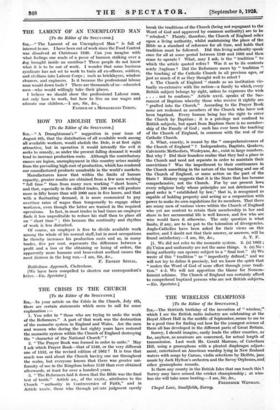THE CRISIS IN THE CHURCH
[To the Editor of the SPECTATOR.] Sm,—In your article on the Crisis in the Church, July 4th, there are certain statements which seem to call for some explanation :- 1. You refer to " those who are trying to undo the work of the Reformers." A part of that work was the destruction of the monastic system in England and Wales. Are the men and women who during the last eighty years have restored the monastic system within the Church of England destroying the " character of the National Church " ?
2. " The Prayer Book was formed in order to unite." May I ask which Prayer Book—that of 1549, or the very different one of 1552, or the revised edition of 1662 ? It is true that much was said about the Church having one use throughout the realm, but everyone knows that there was greater uni- formity of use in the Kingdom before 1549 than ever obtained afterwards, at least for over a hundred years.
3. " The Reformers laid it down that the Bible was the final test of truth." Article xx., of the mix., attributes to the Church " authority in Controversies of Faith," and in Article xxxiv. those who through pri. rate judgment openly
break the traditions of the Church (being not repugnant to the Word of God and approved by common authority) are to be " rebuked." Plainly, therefore, the Church of England relies upon a living authority, whilst maintaining the place of the, Bible as a standard of reference for all time, and holds that' tradition must be followed. Did this living authority speak once for all at some period between 1549 and 1662 and then cease to operate ? What, may I ask, is the " tradition " to
which the article quoted refers ? Was it as to its contents solely Anglican ? Did the Reformers mean by " tradition "I the teaching of the Catholic Church in all previous ages, or just as much of it as they thought well to select ?
4. The Church of England " stands as an institution vir- tually co-extensive with the nation—a family to which every British subject belongs by right, unless he expresses the wish . . . . not to conform." Article xxvii. speaks of the Sac- rament of Baptism whereby those who receive it rightly are " grafted into the Church." According to the Prayer Book none are reckoned as members of the Church who have not been baptized. Every human being has the right to enter, the Church by Baptism ; it is a privilege not confined to British subjects, but apart from Baptism there is no member- ship of the Family of God ; such has ever been the teaching of the Church of England, in common with the rest of the Catholic Church.
5. What, exactly, is meant by the " comprehensiveness of the Church of England " ? Independents, Baptists, Quakers, Calvinistic Methodists, Wesleyans, &c., exist in large numbers. But why ? Did their founders realize that they had a place in the Church and need not separate in order to maintain their convictions ? Was the impediment to their continuance in the Church something in the nature of the teaching and use of the Church of England, or some action on the part of the State ? History suggests that it is the State that has become comprehensive, not the Church. For by our present laws every religious body whose principles are not detrimental to good order is " established by law," that is, is recognized as capable of holding property and acting as a corporation with power to make its own regulations for its members. That there are many men of various views within the Church of England who yet are content to retain their membership in her and share in her sacramental life is well known, and few who are wise would have it otherwise. The only question is what limits, if any, are to be put to the toleration of divergencies. Anglo-Catholics have been asked for their views on this matter, and I doubt not that their answer, or answers, will be
found satisfactory.—I am, Sir, &c., A. T. F. [1. We did not refer to the monastic system. 2. (a) 1662 ; (b) Union and uniformity are not the same things. 3. (a) No : living authority can operate subject to a " final test." (b) We wrote of this " tradition " as " imperfectly defined," and we will not try to define it precisely, but we know the spirit that " makes the Word of God of none effect through your tradi- tion." 4-5. We will not apportion the blame for Noncon-1 formist schisms. The Church of England can certainly afford to comprehend baptized persons who are not British subjects, —En. Spectator.]










































 Previous page
Previous page